Monday Feb 16, 2026
Monday Feb 16, 2026
Tuesday, 25 August 2020 01:17 - - {{hitsCtrl.values.hits}}
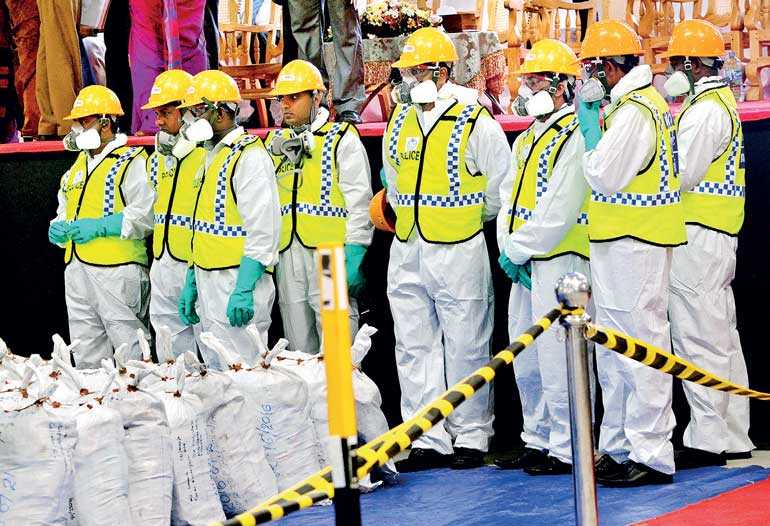
If the drug trade and the people involved in it are to be taken as a case in point, it appears that the country has a long way to go before becoming a righteous and virtuous society by conviction – Pic by Shehan Gunasekara
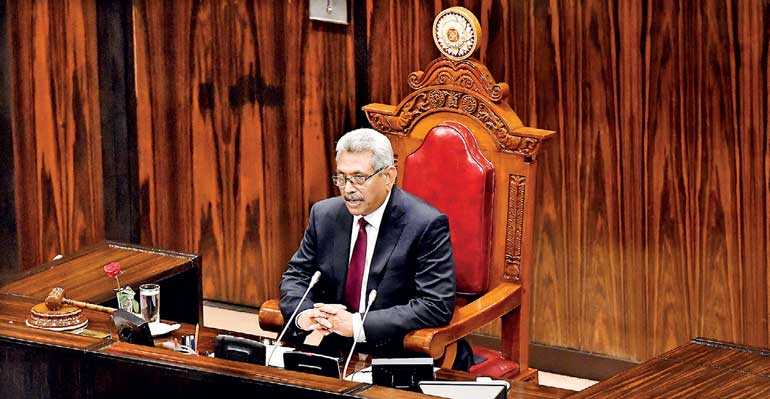
President Gotabaya Rajapaksa
To sing to the deaf, to talk with the dumb, and to dance for the blind are three foolish things
– Indian Proverb
President Gotabaya Rajapaksa reiterated once again the need for Sri Lanka to be a prosperous society and a virtuous society. In a wide ranging policy speech to the new Parliament, he outlined his and his government’s vision for the post-COVID world. While his message was one of hope and opportunity, he did not elaborate on the perilous state of Sri Lanka’s own economy and that of the world. 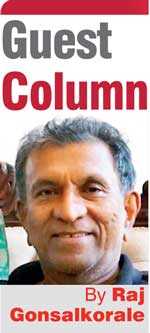
Perhaps he should have been more forthright in placing the very tough times ahead for Sri Lankans in context. Every possible economic indicator shows that things simply cannot get better in the immediate term throughout the world. No one has an idea what the new world is going to look like and none can be blamed for this as what everyone is facing is unprecedented. In the Sri Lankan context, President Rajapaksa could have taken the people into confidence to place the unvarnished truth before them. On the heels of the massive election victory, people would have understood and believed him. At best, his speech was an incomplete State of the Union message. An opportunity lost.
His vision to strengthen the grassroots and through that base, strengthen opportunities for others through an upward chain is commendable. The approach of past governments, Presidents and Prime Ministers had been more or less based on trickle down theories. This was especially so of the neo liberal United National Party. It is refreshing that the focus has shifted to the rural sector that comprises the majority of people in the country.
From a political angle, the voters have endorsed this change of approach having realised their foolishness in dancing to the deaf, dumb and blind UNP and the SLFP. Although former President Sirisena and some SLFP candidates were elected to Parliament, they should be thankful they contested under the SLPP banner. The SLFP contested the Kalutara district on their own and managed a paltry 1.57% of the votes cast. The UNP with 2.15% of the national vote, and the SLFP minus SLPP support, should realise that the voters have got wiser. 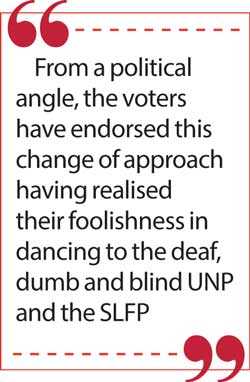
There is a strong message in the Indian proverb for the victor as well as the vanquished. The victor should look to the future and govern for the now and the future, they must desist from making the mistake of under estimating the intelligence of the voters, and be arrogant with power and become the proverb to the people of the country. They should take a leaf from how the people treated the UNP and the SLFP.
A new cabinet and State ministers have been appointed with efficiency and speed. Obviously, instructions are that they should hit the ground running. It needs to be said though that the cabinet on the whole is less than inspiring and whether they are the right persons to take the country forward from the many challenges faced on account of the COVID pandemic. One hopes that their performance will disprove this initial feeling of disquiet.
The vanquished could well be the victors at a future date. They in fact have a significant role in ensuring the victor is held accountable for their promises to the people, and be the voice that airs constructive dissent. They too should discern who is deaf, dumb or blind and who the fools are. They cannot say they could not dance as the music was bad or the floor was crooked. Recriminations are to be expected when a loss is heart wrenching for the loser as it is always someone else who is responsible when someone walks over a cliff, blindfolded. Their strength and hope for the people will be how fast they get up from their fall, and keep moving. The now and the future are far more important than pointing fingers. It is well to remember that four fingers points to the one who is pointing one finger at someone else.
If the victor is once again surrounded by discredited, unprincipled men and women who brought disrepute to the victor, the Judas of the political establishment, then, those who are counselling the victor against that might be singing to the deaf, dumb and the blind. Prostituting oneself by rewarding such dregs of society would not demonstrate that lessons have been learnt and they are ready to move towards the future. It shows a return to the past.
The now and the future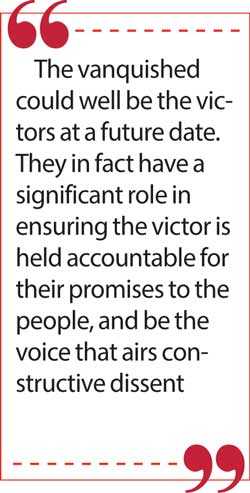
What of the now and the future? Sri Lanka is in a perilous state due to economic mismanagement by several past administrations and the economic devastation caused and being caused by the COVID pandemic throughout the world.
The world will not recover for a considerable period of time for Sri Lanka to be out of the woods. Our primary income earners, tourism and foreign employment is doomed for quite a while. There is great uncertainty as to what kind of industry could be set up to attract direct foreign investment. What is to be manufactured or a service developed for export, will depend on a demand for that in the world and who has the money to invest. Only one country comes to mind which still has money.
This is also the time for the newly elected Opposition and its leader to show his credentials as to how he and his political combine can work with the government to get the country out of its economic morass. The country needs such an approach at this time. How the leader and the combine shows their leadership qualities at this pivotal moment in the country’s history will determine whether the voters will have confidence in them to govern the country at a future date.
The President spoke again about righteousness and the need for a virtuous society. No doubt this is a virtuous expectation.
It has been recorded in ancient Vamsa Katha that when Venerable Mahinda was asked whether Buddhism had taken hold in Sri Lanka after it was introduced by him to ancient Sri Lanka, he had reportedly stated that it had spread but not rooted deep.
Judging by the social ills afflicting the Sri Lankan society, what Venerable Mahinda reportedly said hundreds of years ago, seems true even today. Superficiality is rife but inner Dhamma seems wanting.
Biggest social ill
The biggest social ill today is the proliferation of drug use throughout the entire country. Recent efforts being made to uncover the supply chain of drugs has uncovered many large and small fish, but yet to uncover the sharks who are heading the supply chain in the country. Some say that sharks may include some occupants of the house in Diyawanna Oya, past and even present, and are unlikely to be brought to justice. Time will tell.
The government of President Gotabaya Rajapaksa has to be commended for launching this attack on the drug menace. This menace didn’t start yesterday and one wonders why it was allowed to grow into the efficient supply chain it had become over the years. Its efficiency is such that thousands of young people as well as older people have got hooked onto drugs, and if they have the money, they are able to obtain their supplies easier than getting a betel chew or a chewing gum.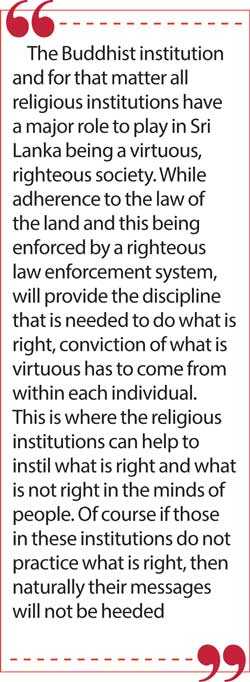
Many schoolchildren have begun their youthful foolishness with drugs which then turns into ruination of their lives as it has been so easy to obtain drugs. Older people have left their families in ruins as they have resorted to even selling window shades in their homes to buy drugs once addicted to them.
Recent apprehensions of those involved in the drug trade have shown that law enforcement officers have been at the apex of those running the supply chain. Customs officers, shipping companies, three-wheeler drivers and retail sellers of sweets near schools and even some associated with the justice system have been involved. The supply chains are many, and it’s pervading and found in all corners of the society.
The damage done to human beings by these scums of society is immeasurable.
All this is in a predominantly Buddhist society where no function can take place today without the Buddhist clergy being present and people with their hands clasped not in a demonstration of adherence to the Dhamma, but in compliance with a State-sponsored phenomenon that promotes a particular cultural identity for Sri Lanka.
Leaving aside living the Dhamma, as that is what is expected of a Buddhist or for that matter any other considering the universality of the Dhamma, the role played or in fact not played by the Buddhist institution to provide solace and counselling to the young and the old who resort to drug use, shows the ineffectiveness and even callousness of the institution.
While young people may begin their sad journey as an experimentation of how they can alter their minds and go into another world temporarily, older people very likely resort to drugs to overcome some mental pain they may be experiencing on account of personal, family and societal pressures.
Either way, enticing and encouraging drug use is neither Buddhist, Christian nor Islamic, and not humanistic.
The damage done by drugs is far greater than what COVID has done or will continue to do. It is oxymoronic to talk about a virtuous society where drugs have been so freely available to all and sundry and where this trade had been making some people very prosperous at the expense of a permanent damage to the health and wellbeing of so many people, mostly the young.
The Buddhist institution and for that matter all religious institutions have a major role to play in Sri Lanka being a virtuous, righteous society. While adherence to the law of the land and this being enforced by a righteous law enforcement system, will provide the discipline that is needed to do what is right, conviction of what is virtuous has to come from within each individual.
This is where the religious institutions can help to instil what is right and what is not right in the minds of people. Of course if those in these institutions do not practice what is right, then naturally their messages will not be heeded.
If the drug trade and the people involved in it are to be taken as a case in point, it appears that the country has a long way to go before becoming a righteous and virtuous society by conviction. Prosperity built on a foundation that is not based on genuine righteousness will neither be virtuous nor long lasting.